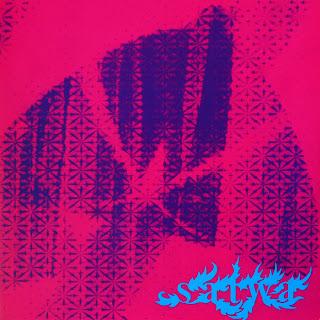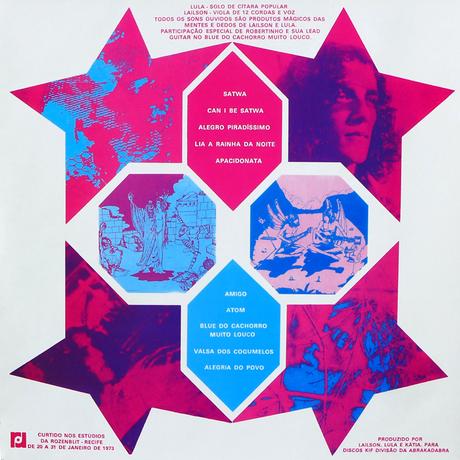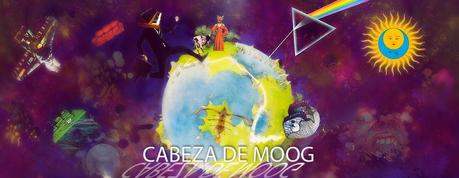
Revivimos el folk indú psicodélico brasilero e instrumental de Satwa, o algo más o menos así. Fue grabado en 1973 y en ese momento casi nadie lo oyó, siendo un fracaso comercial. Hoy en día este es un disco codiciado por los coleccionistas, porque parece que no solo es imposible de encontrar en todo Brasil, sino también en Recife, Pernambuco, que es la ciudad donde fue lanzado originalmente. Un disco muy particular, que intenta decir muchas cosas sin palabras en una época de censura (en plena dictadura) y con un juego estilístico que se las trae.
Artista: SatwaÁlbum: Satwa
Año: 1973
Género: Indo-Prog / Raga Rock / Folk psicodélico
Duración: 46:11
Nacionalidad: Brasil
Si, si, una mezcla muy rara. Lo he escuchado un par de veces, y en mi opinión personal, este disco (como un montón de trabajos de psicodélico oscuro y psych-folk ) está un poco sobrevalorado, al menos en referencia a la cantidad de comentarios entusiastas que encontré. Es bastante fresco, y quizás a los amantes del psicodélico y del folk setentoso les va a encantar, pero no consigue hacerme vibrar demasiado.
Un disco que sus autores (Lula Cortez y Lailson de Holanda Cavalcanti) comentaron en una revista románticas declaraciones acerca de la forma en que intentaron crear una vocalización sin palabras debido a la censura de la dictadura militar.
"Satwa" es un disco con vocalizaciones sin palabras, parte del álbum es bonito y tiene un buen ambiente, pero también hay una ensalada de diferentes estilos acústicos interpretados de forma libre que no terminan de cuajar del todo.
Brazilian 70's dreamlike, acid-folk guitar project. It's largely an acoustic guitar orientated "trip". Their eponymous album (a private press LP originally released in 1973) provides emotional, luminous Latin psych vibes with omnipresent "raga" harmonies. The duet is composed by Lula Cortez (on guitar and popular Morocco sitar) and Lailson de Holanda Cavalcanti (12 strings guitar, voice). One composition feature Robertinho Do Recife on electric guitar (see picture on the right). Constantly imaginative with dense buzzing ragas, this one is definitely essential for fans of progressive folk, eastern sonorites and peaceful ambiences. An other highway to Heaven!Progarchives
"Written, recorded and released just as Brazil's military dictatorship reached the climax of its long black arc, the one and only album by Satwa is a divinely subtle protest. Now issued for the first time in America through the venerable Time-Lag Records in Maine and the stewardship of freeform fixture Erika Elder, Satwa, often cited as Brazil's first independent record, is a mellow starburst of acoustic jangle.

A little but brilliant Brazilian 70's acid folk formation. Almost exclusively acoustic and dominated by bucolic guitar parts, the music is an intricate manifestation of stylistic, floating "eastern" exercises, largely structured, simplistic and efficient. All tracks develop colourful, dreamy-like raga guitar interludes. The beautiful psych-pastoral base line is comparable to musical motifs ever developed by Teutonic bands (notably Witthuser & Westrupp and Holderlin at their most evanescent moments). With a positive, gentle energy, "Satwa" & "Can I Be Satwa" definitely show the "raga" side of the band. "Alegro Piradíssimo" is a poetical, sad ballad. "Lia a Rainha da Noite " carries on a delicious, fragile pastoral composition. "Apacidonata" sounds as an other desperate ballad in a semi-classical guitar style. A beautiful, sad, grave and almost "cosmic" voyage. "Amigo" is a sunny, luminous pastoral guitar composition. "Blue do Cachorro Muito Louco" contains some nice technical & melodic guitar lines punctuated by discreet linear voices, with its always recognizable folk accompaniment. An impressive, meditative folk base "work" made of short instrumental songs. From Latin prog folk, (in some points) it tends to be better than the classic Arco Iris first essays.Philippe
I listened to this the other day. It is definitely pleasant background music.Brendan
The first song is a very nice acoustic number, with acoustic guitars in the back ground and some nice work on the Sitar, though they play the Sitar in a Western Style, with less emphasis on the spiritual sound on Indian music. Even I'm not sure if they are playing a Sitar or another instrument. Anyway this is good acoustic music. However, every song is pretty much the same, only "Valsa Dos Cogumelos" which features some very interesting electric lead guitar work.
However, the rest is very good acoustic guitar music, but somehow I wanted more... Not bad, nonetheless. Good mood-setter.
This album, even with the fact that is not well recorded, is an interessant piece of progressive rock. With a tendence to the indo - prog, satwa can make a sound full of elements such as in progressive rock, as a folk sound from Brazil. Lula Cortez, the lead member, is famous in Brazil for do it an experimental sound, and this album is a sample of what he can do with an simple guitar and a lot of ideas. I recomend this album for those who like of diferente aproches to the progressive and the folk music.Henrique Cabral
Formed after the return of Lula Côrtes and Lailson from their respective foreign excursions – the former a beardo home after the requisite Moroccan sojourn, the latter a young long-hair back from the States – Satwa lasted only a year, perhaps due to their differing stripes. Lailson was from the verdant former Dutch colony of Pernanbuco, while Côrtes hailed from the wild badlands of Paraiba. But for 11 days in January 1973 the pair jammed cross-legged and produced the folk trance gems that adorn this self-titled debut.Bernardo Rondeau
At a time when censors caused newspapers to run cake recipes on their front pages in place of rejected news stories, Lailson only lets the occasional throat drone slip through his lips. Largely void of voice and word, the songs – Côrtes plucking steely leads from his sitar while Lailson's 12-string thrums crystalline chords – are loose and lovely. The sole interference in these glistening arabesques is the hoary electric fretwork of one Robertinho on "Blues do Cachorro Muito Louco," the most explicitly fried track. Otherwise, Côrtes and Lailson are left to experiment in musty silence. Seemingly taped live, each track is a dry documentation of the duo's gently rambling improvisations. Far from the recombinant psychedelia of tropicalismo that reigned over the pre-hippie underground in Brazil's bustling metropolises five years earlier, Satwa play bed peace bards. In double-mono, or fake stereo, Satwa is raw, untreated mentalism translated into pure songflow. At times exhausted and dusty – "Atom" – or archaically splendorous – "Valse Dos Cogumelos" – the duo's spiraling scrolls etched in rustic timbres unfurl gracefully.
Côrtes, now a graying painter, would go on to record the more explicitly weird Paêbirú (also recently reissued) with Zé Ramalho. A concept album about extraterrestrials in Paraiba's arid backwoods, it had long been anointed a masterpiece of the era. After dabbling in rock outfits, Lailson broke into the mainstream as a newspaper cartoonist, a job he has kept to this day. Neither were or will probably ever be Satwa again, but during those few days and from now on, Satwa is a quiet triumph.
This is one of the many great Rozenblit releases from 70’s Brazil. It was released privately three years before the celebrated, and one of the most psychedelic albums from Brazil, Cortez/Ramhalo : Paebiru. This mostly guitar-based album is as much a one of a kind guitar based album, which is pretty improvised. The two guitarists here show a brilliant psych-fluent instant-duet understanding, with melodic variation. Lula Cortez plays guitar or the “popular Morocco sitar”, while Lailson de Holanda Cavalcanti plays 12-string guitar and …let’s say uses his voices a bit. Special guest guitarist on one track is Robertinho Do Recife. Both artists are so dedicated to one another, the music becomes like one organic but structured evolution. Also the sitar is used as if resonating the lead guitar.Psychedelicfolk
O raro ‘Paêbirú’ com Zé Ramalho é clássico, mas ‘Satwa’, desta vez com Lailson, é outra obra-prima do pernambucano Lula Côrtes, que não merece a obscuridade a que foi submetida por três décadas.Fernando Rosa
Gravado em 1973, o disco traz a dupla tomada por uma lisergia pós-Woodstock, capaz de assustar incautos ouvintes em pleno 2001. Músicas como ‘Alegro Piradissimo’, ‘Valsa dos Cogumelos’ ou ‘Blue do Cachorro Muito Louco’ não deixa dúvidas sobre o conteúdo do vinil tosco, mas com ótimo som.
Instrumental, com pequenas incursões vocais, o disco traz dez canções "produtos mágicos das mentes e dedos de Lailson e Lula", como diz na contra-capa do álbum, produzido pela dupla, mais Kátia. Além dos de Lula e Lailson, Robertinho de Recife também faz uma ponta no disco, tocando ‘lead guitar’ em 'Blue do Cachorro Muito Louco’, um blues lento e viajandão.
O som predominante do disco, no entanto, é um folk nordestino/oriental, resultado da mistura da cítara popular tocada por Lula, e da viola de 12 cordas de Lailson. Algo como uma sucessão de ragas ou mantras, interpretadas por Cego Aderaldo movido a incenso, cogumelos e outros "expansores da musculatura mental", como diz Arnaldo Baptista.
Fruto da cena nordestina pós-tropicalismo e/ou psicodélica, ‘Satwa’ foi "curtido" nos Estúdios da Rozenblit, em Recife, entre os dias 20 e 31 de janeiro de 1973. Participam do disco, ainda Paulinho Klein, que divide com Lula as "curtições fotográficas" e o engenheiro de som Hercílio Bastos (dos Milagres).
Com tiragem limitada e distribuição basicamente regional, o disco desapareceu tão logo surgiu, permanecendo como uma lenda para o restante do país. Sem reedição em vinil, e inédito em cd, ‘Satwa’ ainda não entrou para o catálogo informal de cdrs que, mal ou bem, democratiza o acesso à história musical do país.
Si les gusta el psicho-folk setentero y las rarezas, llévense este disco, les va a encantar. Sino, bueno, hay muchas cosas piolas en el blog como para perder demasiado tiempo.
Lista de Temas:
1. Satwa
2. Can I Be Satwa
3. Alegro Piradíssimo
4. Lia A Rainha Da Noite
5. Apacidonata
6. Amigo
7. Atom
8. Blue Do Cachorro Muito Louco
9. Valsa Dos Cogumelos
10. Alegria Do Povo
Alineación:
- Lula Cortez / guitar, Morocco sitar
- Lailson de Holanda Cavalcanti / 12-string guitar, voice
Guest musician:
Robertinho Do Recife / guitar

